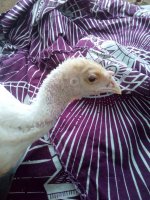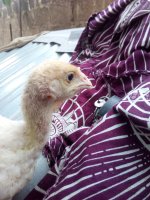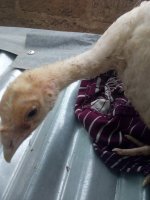Navigation
Install the app
How to install the app on iOS
Follow along with the video below to see how to install our site as a web app on your home screen.
Note: This feature may not be available in some browsers.
More options
You are using an out of date browser. It may not display this or other websites correctly.
You should upgrade or use an alternative browser.
You should upgrade or use an alternative browser.
My 7weeks old turkeys has fowl pox
- Thread starter dadulcie
- Start date
Pics
More options
Who Replied?sarcasm
Songster
Sorry your poult is sick. It seemed like every bird in our area got fowl pox this past spring when it rained for 2 weeks straight then immediately got hot.
Isolate the poult if at all possible, fowl pox is contagious but slow spreading. The vaccinations may keep the other ones from getting it, or may not. Check the poult over well, you may actually find a cut or broken/missing claw - that's usually how the virus gets started with the first bird in a flock (though not always, they can get it from the ground or even wild birds).
There's no real cure for fowl pox, so the "treatment" is basically just giving the bird's own immune system a helping hand fighting it off.
Give a vitamin supplement (one of the kinds you add to the water is easiest as long as the poult is drinking), consider probiotics (added to the water, found near the poultry vitamin supplements usually) or live culture yogurt (as a food/treat) as well. If it's not real hot where you're keeping the poult, consider adding electrolytes (like Gatorade, a little is beneficial but a lot becomes a problem, and it's easy for them to get too much if they're drinking a lot because of the heat). Pay attention for any signs of a secondary infection that may set in while the bird's immune system is compromised. You may want to have antibiotics on hand in case you need to treat for a secondary infection (because you never seem to need poultry antibiotics at 1pm on a Tuesday when everything is open - it's always after 6pm on a Sunday before a holiday or something).
What you have right now appears to be the "dry" form of fowl pox - it's rarely fatal and will just look bad for a while. Those sores near the eyes may cause one or both eyes to swell shut temporarily - hopefully not at the same time, but if they do you can try soaking the eye area with a warm wet cloth enough so they could open at least one (I had reasonable success with this, I only had to do it once).
Pay close attention while the pox runs its course, it can become "wet" at any point - which basically means it starts forming sores inside the mouth and throat. This can be dangerous because it can prevent the bird from eating/drinking or possibly breathing if it gets bad enough. I have not personally experienced wet pox, but I've seen recommendations for removing the scabs from the sores inside the mouth in order to keep the bird functioning.
Isolate the poult if at all possible, fowl pox is contagious but slow spreading. The vaccinations may keep the other ones from getting it, or may not. Check the poult over well, you may actually find a cut or broken/missing claw - that's usually how the virus gets started with the first bird in a flock (though not always, they can get it from the ground or even wild birds).
There's no real cure for fowl pox, so the "treatment" is basically just giving the bird's own immune system a helping hand fighting it off.
Give a vitamin supplement (one of the kinds you add to the water is easiest as long as the poult is drinking), consider probiotics (added to the water, found near the poultry vitamin supplements usually) or live culture yogurt (as a food/treat) as well. If it's not real hot where you're keeping the poult, consider adding electrolytes (like Gatorade, a little is beneficial but a lot becomes a problem, and it's easy for them to get too much if they're drinking a lot because of the heat). Pay attention for any signs of a secondary infection that may set in while the bird's immune system is compromised. You may want to have antibiotics on hand in case you need to treat for a secondary infection (because you never seem to need poultry antibiotics at 1pm on a Tuesday when everything is open - it's always after 6pm on a Sunday before a holiday or something).
What you have right now appears to be the "dry" form of fowl pox - it's rarely fatal and will just look bad for a while. Those sores near the eyes may cause one or both eyes to swell shut temporarily - hopefully not at the same time, but if they do you can try soaking the eye area with a warm wet cloth enough so they could open at least one (I had reasonable success with this, I only had to do it once).
Pay close attention while the pox runs its course, it can become "wet" at any point - which basically means it starts forming sores inside the mouth and throat. This can be dangerous because it can prevent the bird from eating/drinking or possibly breathing if it gets bad enough. I have not personally experienced wet pox, but I've seen recommendations for removing the scabs from the sores inside the mouth in order to keep the bird functioning.
New posts New threads Active threads
-
Latest threads
-
-
-
Is this blue copper marans a pullet or a cockerel?
- Started by MotherFlockers
- Replies: 0
-
I want the pecking order to go back to how it used to be! Help!
- Started by Brownix Hobby Farm
- Replies: 3
-
-
-
Threads with more replies in the last 15 days
-
-
-
Two dead chicks in brooder pen
- Started by redinator
- Replies: 69
-
-
-
×



